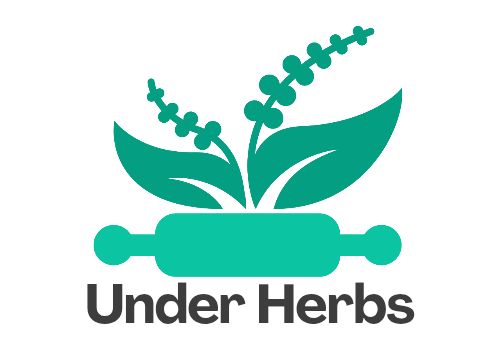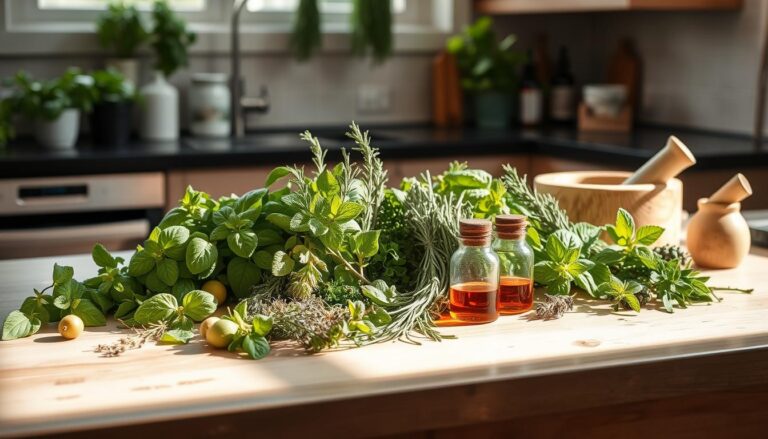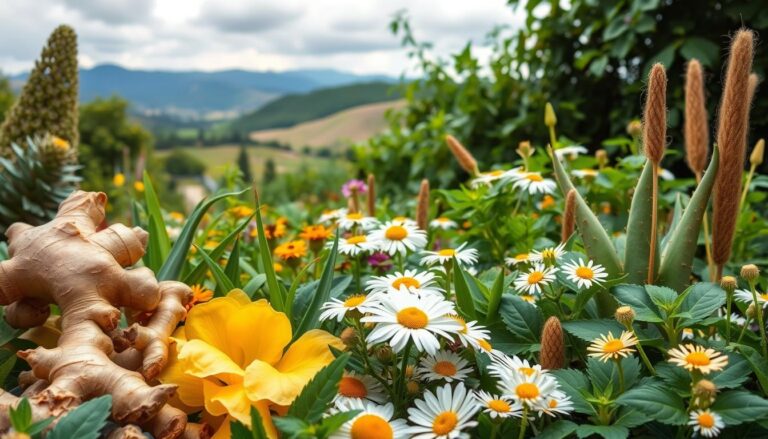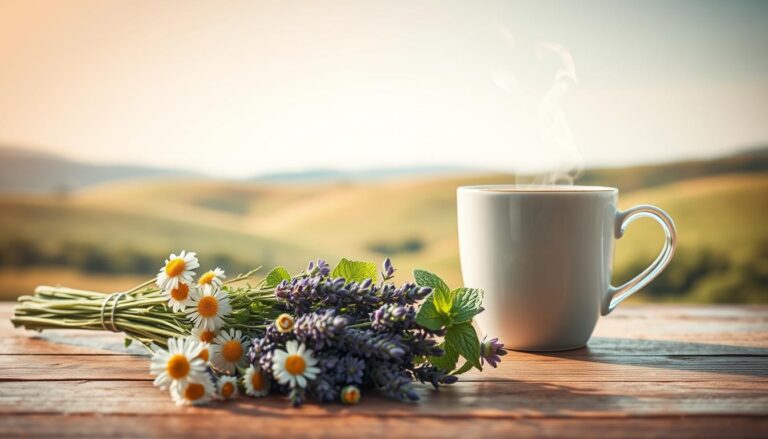Enjoy the Goodness of Herbal Infusions
Are you searching for a natural way to calm your senses and enhance your well-being? Herbal teas have been a key part of traditional wellness for centuries. They offer many benefits without the caffeine.

Rich in antioxidants and therapeutic properties, these teas help with relaxation, better sleep, and digestive health. With so many flavors and blends, there’s an herbal infusion for everyone.
Key Takeaways
- Herbal teas offer a caffeine-free alternative for relaxation and wellness.
- Rich in antioxidants, they support overall health and well-being.
- Various blends cater to different needs, from sleep improvement to digestive support.
- Herbal infusions have been used for centuries in traditional wellness practices.
- They provide a natural way to soothe the senses and promote relaxation.
The Healing World of Botanical Beverages
More and more people are looking for natural ways to stay healthy. They’re drawn to herbal tisanes because they offer a natural way to feel better. These blends are seen as a better choice than synthetic products.
Understanding What Makes a True Herbal Infusion
Herbal infusions are made by soaking herbs, spices, and flowers in hot water. They’re different from regular teas because they don’t have caffeine. This makes them great for those who want to avoid caffeine or try new tastes.
The Difference Between Herbal Infusions and Traditional Teas
Herbal infusions and traditional teas are made from different things. Traditional teas come from the Camellia sinensis plant. Herbal infusions, on the other hand, use a variety of plants. This change affects the taste, caffeine level, and health benefits.
Why Americans Are Embracing Natural Alternatives
Americans are choosing herbal infusions for many reasons. They want products that are healthier and more natural. Herbal infusions offer several benefits, including:
- Promoting relaxation and reducing stress
- Supporting digestive health
- Offering antioxidant properties
- Providing a caffeine-free alternative to traditional teas
By trying herbal infusions, people can enjoy new flavors and possibly improve their health.
The Ancient History and Cultural Significance of Herbal Tisanes
Herbal infusions have been around for thousands of years. They were key in ancient cultures for both taste and health. These natural drinks were a big part of old medicine and rituals worldwide.

Traditional Medicinal Uses Throughout History
For centuries, herbal tisanes were natural remedies for many problems. Each culture made its own special blends with local herbs. This created a rich history of medicine.
In ancient China, herbal decoctions were used for health. In Europe, herbal teas helped with many health issues.
Cultural Rituals and Ceremonies
Herbal tisanes were also important in cultural rituals. Making and drinking herbal teas was seen as sacred in many places. It was done during special times or daily.
In Japan, the tea ceremony, mainly with green tea, also inspired herbal infusions. It taught mindfulness and a bond with nature.
The Modern Revival of Herbal Wisdom
Lately, there’s a big interest in organic herbal blends and old tea-making ways. This is because people want natural health and to go back to old wellness ways. So, tea blends that were once old-fashioned are now loved for their taste and health perks.
Herbal tisanes mean more than just health. They connect us to our heritage and traditions. By exploring these ancient drinks, we honor the past and choose a healthier, greener life.
10 Most Beneficial Herbal Infusions for Everyday Wellness
Adding herbal infusions to your daily life can boost your health. Herbal teas have been a natural health aid for centuries. They offer a healthy choice instead of traditional medicines.
Chamomile: Nature’s Calming Agent
Chamomile tea is famous for its calming effects. It’s great for those who want to lower stress and sleep better. The apigenin in chamomile helps calm the brain, reducing anxiety and helping you sleep.
Peppermint: Digestive Support and Mental Clarity
Peppermint tea is good for your stomach. It relaxes stomach muscles and improves focus. It’s a perfect choice to wake you up during the day.
Lavender: Stress Relief and Better Sleep
Lavender tea calms you down, like chamomile. It helps reduce stress and ensures a good night’s sleep. The lavender scent is also used in aromatherapy for its calming effects.
Ginger: Inflammation Fighter and Immunity Booster
Ginger tea has been used for ages for its health benefits. It fights inflammation and boosts your immune system. It’s also great for nausea and digestion.
Hibiscus: Heart Health and Antioxidant Power
Hibiscus tea is full of antioxidants. It helps lower blood pressure and cholesterol, supporting heart health. Its fruity taste makes it a joy to drink every day.
Lemon Balm: Anxiety Relief and Cognitive Support
Lemon balm tea helps with anxiety and improves your mind. It tastes light and citrusy, perfect hot or cold.
Rooibos: Caffeine-Free Antioxidant Source
Rooibos tea is caffeine-free but full of antioxidants. It’s good for your heart and bones. You can drink it anytime.
Echinacea: Immune System Strengthener
Echinacea tea boosts your immune system. It can make colds and flu less severe. It’s a favorite in winter.
Valerian Root: Natural Sleep Aid
Valerian root tea helps you sleep better. It’s a natural sleep aid without the risk of addiction. It promotes relaxation.
Dandelion: Detoxification and Liver Support
Dandelion tea cleanses your body and supports your liver. It’s a natural diuretic that reduces bloating. It aids in digestion too.
These herbal teas offer many benefits. They help with stress, sleep, digestion, and immune health. Adding them to your daily routine can greatly improve your well-being.
The Science Behind Herbal Infusions and Their Therapeutic Effects
Herbal infusions are more than just drinks. They are a blend of natural compounds that help us stay healthy. These tisanes have been used for centuries to boost our wellbeing.

Active Compounds and Their Benefits
Herbal infusions are packed with antioxidants and anti-inflammatory agents. These are the key players behind their healing powers. For example, antioxidants fight off free radicals, which can harm our bodies.
These compounds offer many benefits. They can:
- Reduce inflammation and improve health
- Boost brain function and clear thinking
- Strengthen our immune system and lower illness risk
- Help us relax and manage stress
Research-Backed Health Claims
Many studies have looked into herbal infusions’ health benefits. For instance, chamomile calms the mind and body. Peppermint improves digestion. These findings show why herbal infusions are great for our daily health.
How Herbal Constituents Are Extracted Through Infusion
Infusion is key to getting the good stuff from herbs. Hot water helps release the active compounds. This makes the infusion a mix of these beneficial elements.
Knowing how herbal infusions work helps us use them wisely. It lets us tap into their healing powers for better health.
Mastering the Art of Brewing Perfect Herbal Infusions
The art of brewing herbal infusions is a journey. It combines tradition, technique, and personal preference. To enjoy their benefits and flavors, one must understand their preparation.

Essential Equipment for the Herbal Tea Enthusiast
First, you need the right equipment. This includes a tea infuser or strainer, a teapot, and a cup. The material of these tools matters; glass or ceramic teapots are best to avoid flavor transfers.
Optimal Water Temperatures for Different Herbs
Different herbs need different water temperatures. For example, chamomile needs cooler water, while roots and barks need boiling water. This ensures they release their best flavor and benefits.
Steeping Times: The Secret to Maximum Flavor and Benefits
The steeping time is key. Leaves and flowers steep for 5-7 minutes, while roots take 10-15 minutes. Adjusting steeping times can customize the infusion to your taste and needs.
Fresh vs. Dried Herbs: Pros and Cons
Fresh and dried herbs have their benefits. Fresh herbs offer a vibrant flavor, while dried herbs are convenient and last longer. Your choice depends on taste, availability, and the herbal infusion you’re making.
Creating Custom Blends for Personal Wellness Goals
Creating custom blends is a joy of brewing herbal infusions. You can make blends for relaxation, energy, or digestive health. By experimenting with different herbs and proportions, you can create unique and beneficial blends.
Mastering these aspects of brewing herbal infusions can enhance your tea experience. It opens a world of flavors and health benefits that these natural remedies offer.
Seasonal Guide to Herbal Infusions Throughout the Year
As the seasons change, we can use herbal infusions to boost our health. Each season brings its own set of herbs and blends. These can help us stay healthy and feel good.
Spring Cleansing and Renewal Blends
Spring is a time for renewal. Herbal infusions like dandelion root, nettle, and lemon balm are great then. They help clean our bodies and lift our spirits.
Summer Cooling and Hydrating Infusions
Summer brings hot weather. Herbal teas like peppermint, hibiscus, and rosehip tea cool us down. They’re also full of vitamins and minerals.
Fall Immune Support and Warming Spices
Fall brings cooler air. Our immune systems need warming spices and herbs. Ginger, echinacea, and cinnamon are good choices. They help us get ready for winter.
Winter Comfort and Respiratory Support
In winter, we need comforting teas. Chamomile, elderberry, and thyme are great. They help our breathing and keep us cozy.
| Season | Recommended Herbs | Benefits |
|---|---|---|
| Spring | Dandelion root, Nettle, Lemon balm | Detoxification, Renewal |
| Summer | Peppermint, Hibiscus, Rosehip | Cooling, Hydrating, Rich in Vitamins |
| Fall | Ginger, Echinacea, Cinnamon | Immune Support, Warming |
| Winter | Chamomile, Elderberry, Thyme | Respiratory Support, Comforting |
Adding these herbal infusions to our daily lives can improve our health all year. Whether it’s a cool summer drink or a warm winter tea, there’s something for every season.
Herbal Infusions for Specific Health Concerns
More people are looking for natural ways to stay healthy. Herbal infusions are being rediscovered for their health benefits. They can be made to help with specific health issues, offering a personal approach to wellness.
Sleep Enhancement and Relaxation Formulas
For those who have trouble sleeping, herbal infusions like chamomile and valerian root are great. These herbs calm the mind and body, helping you sleep better.
Digestive Health and Gut Support
Herbal infusions with peppermint and ginger are good for your stomach. They can ease indigestion and help keep your gut healthy.
Stress Management and Emotional Wellbeing
Herbs like lavender and lemon balm are used in infusions for stress relief. They help keep your emotions balanced, especially when you’re feeling stressed.
Energy Enhancement Without Caffeine
If you want energy without caffeine, try ginseng and rooibos herbal infusions. These herbs naturally boost your energy.
Women’s Health Support
Herbal infusions like red clover and raspberry leaf are good for women’s health. They’re especially helpful during menopause and pregnancy.
Men’s Wellness Blends
Herbal infusions for men’s health include ginseng and saw palmetto. They help with prostate health and overall wellbeing.
| Health Concern | Recommended Herbal Infusion | Benefits |
|---|---|---|
| Sleep Enhancement | Chamomile, Valerian Root | Promotes restful sleep, reduces anxiety |
| Digestive Health | Peppermint, Ginger | Alleviates indigestion, supports gut health |
| Stress Management | Lavender, Lemon Balm | Reduces stress, promotes emotional wellbeing |
Knowing the health benefits of different herbal infusions helps you make better choices. Whether it’s for better sleep, digestive health, or stress relief, there’s an herbal infusion for you.
Creative Ways to Incorporate Herbal Infusions Beyond the Teacup
Herbal infusions can be used in many ways beyond just drinking them. They are versatile and can be used in cooking, beauty treatments, and more. This makes them a great addition to our daily lives.
Culinary Applications in Cooking and Baking
Herbal infusions can add unique flavors to dishes. For example, chamomile infusion is great in desserts. Peppermint can make salads and drinks taste better. You can also make infused syrups for cocktails and other drinks.
Herbal Ice Cubes and Cold Infusions
Herbal ice cubes are perfect for hot days. Just make a strong infusion, pour it into ice cube trays, and add to drinks. Cold infusions are made by steeping herbs in cold water for a long time. They make a smooth, low-tannin drink.
DIY Beauty Treatments and Bath Soaks
Herbal infusions can also be used in beauty routines. For example, a lavender infusion can relax you in a bath. It can also be used as a final rinse for healthy hair.
Herbal Infused Honey, Syrups, and Vinegars
Infusing honey, syrups, and vinegars with herbs is another creative use. These products can be used in cooking, as gifts, or as health supplements. For instance, herbal infused honey can soothe a sore throat. Herbal vinegar is great in salad dressings.
Herbalist Rosemary Gladstar says, “Herbal infusions can be a powerful tool in our daily lives. They offer a natural and holistic approach to health and wellness.” Using herbal infusions in different parts of our lives can bring many benefits.
Embracing the Daily Ritual of Herbal Infusions
Adding herbal infusions to your daily routine can greatly improve your health. They offer a natural way to support a balanced lifestyle. This simple step can make a big difference in your well-being.
Herbal infusions can be customized to fit your needs. They can help you relax, increase your energy, or aid in digestion. As a natural remedy, they are gentle yet effective in addressing health issues.
By making herbal infusions a regular part of your day, you can lead a healthier life. Their many benefits and flexibility make them a favorite for those looking for natural wellness solutions.
FAQ
What are herbal infusions, and how do they differ from traditional teas?
Herbal infusions, also known as herbal teas or tisanes, are made from herbs, fruits, flowers, or other plant materials. They differ from traditional teas because they’re not made from the Camellia sinensis plant leaves. This plant is used to make black, green, white, and oolong teas.
What are the benefits of drinking herbal infusions?
Drinking herbal infusions can help you relax, support your digestive health, boost your immunity, and offer antioxidant benefits. Each herb has its own unique properties, making them good for different health needs.
Can herbal infusions be used for medicinal purposes?
Herbal infusions have been used for centuries for their health benefits. But, they should not replace medical treatment. Some herbs can interact with medicines or worsen health conditions. Always talk to a healthcare professional before using them for health reasons.
How do I brew the perfect herbal infusion?
To make the perfect herbal infusion, use high-quality, organic herbs and the right water temperature. Steeping times vary, but usually range from 5-10 minutes. Try different herb-to-water ratios and steeping times to find your favorite flavor and strength.
Can I use fresh herbs for herbal infusions, or should I use dried herbs?
You can use both fresh and dried herbs for herbal infusions. Fresh herbs give a more vibrant taste, while dried herbs are easier to store and use. Some herbs, like peppermint and chamomile, work well fresh or dried. Others, like ginger and turmeric, are often dried.
How can I incorporate herbal infusions into my daily routine?
Enjoy herbal infusions hot or cold, with or without sugar, at any time. Try them in the morning, as a calming drink before bed, or as a pick-me-up during the day.
Are herbal infusions safe for everyone to consume?
Herbal infusions are usually safe, but some herbs might not be good for everyone. Pregnant or breastfeeding women, people with certain health issues, or those on specific medicines should be cautious. Always check with a healthcare professional if you’re unsure.
Can I create custom blends of herbal infusions?
Yes, making your own blends is a great way to customize herbal infusions. Mix different herbs, adjust the ratios, and play with steeping times to create unique flavors that meet your needs and preferences.
How can I use herbal infusions beyond drinking tea?
Herbal infusions can be used in many creative ways. Try them in cooking and baking, as herbal ice cubes, or in DIY beauty treatments and bath soaks. You can also make herbal infused honey, syrups, and vinegars.







